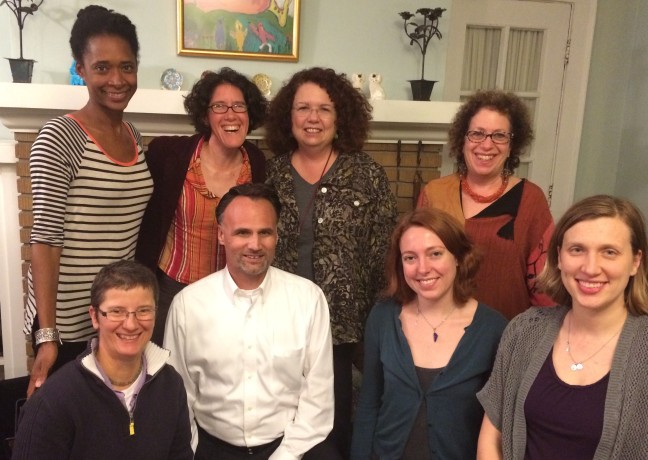by Annie Frazer

What will it take to get Montessori to more children and families, especially those for whom a private-school education is out of reach? A group of passionate Montessorians in Atlanta has formed to take up this challenge for our city and region. We are in the process of forming a new organization to expand access to high-quality Montessori education for children in under-served communities in Atlanta and across Georgia.
Our work together started in September, but its roots in each of our personal stories go back much further. For me, you could say it started in 1990, when I graduated from my private Montessori school and started off to seventh grade in the Atlanta Public Schools. What made for a good class, a good teacher, a good education? I wondered then. And how could it be available for everyone all the time? After nine years of teaching young adolescents in a private Montessori school, I had come to believe that Montessori pedagogy holds a compelling answer to the first question, and I was ready to start tackling the second. I was thrilled to find a first collaborator in Joen Bettmann, AMI primary trainer.
For Joen, expanding access to Montessori in Georgia for the children who need it most is a natural next step in her work. Nearly all of her teaching experience has been in central-city neighborhoods with broad economic disparities– she spent many years at Highland Community School in Milwaukee, which deliberately nurtures a racially and economically diverse community of children and adults. Now working as a trainer, she was excited for the opportunity to combine her deep commitment to social justice with her life’s work as a Montessorian.
Joen reached out to former students and fellow Atlantans she knew had a social-justice vision for Montessori expansion, and we gathered for our first meeting on September 11, in honor of Montessori’s vision of world peace through education. We have committed to reconvening each month to share our progress and chart our next steps. With high-energy living-room meetings, flip charts, and plates of snacks, Joen tells us happily that “it feels like the sixties all over again!” A good omen for a grassroots group.
We are currently exploring the possibility of starting a lab school in the Atlanta area that could serve as a model replicable across Georgia. We have met with representatives from the Georgia Charter Schools Association and have talked with people employed in several school districts to assess their leaders’ relative openness to innovative models and school autonomy. We have also been in contact with Connie Black of Montessori Partners Serving All Children (a program of the Montessori Center of Minnesota) to learn more about the possibility of starting with a privately funded, sliding-scale Children’s House program that could feed a charter elementary school, a model demonstrated by Cornerstone Montessori in St Paul among others.
Another challenge we are preparing to tackle is the creation of a path to Georgia teacher certification through Montessori training. A good precedent for collaboration between the Montessori community and the state of Georgia has already been established: several years ago, members of the Montessori Administrators of Georgia, led by Jan Deason of Arbor Montessori School, worked with the Georgia Department of Early Care and Learning to create a Montessori version of the state quality rating standards for early childhood environments, a huge accomplishment for the state and the Montessori community.
We are hoping to build on that momentum– and follow the example of South Carolina, Connecticut and Ohio– by developing a Montessori pathway to Georgia teacher licensure. Initial steps include researching existing paths to certification in Georgia and learning more about the policies developed in the states that have completed this work, as well as those that have taken it on but not yet gotten it passed. (If you have a model policy to share or know of resources that could help us, please share them!)
Finally, we are seeking ways to support the few Montessori classes that currently exist within traditional public schools in Metro Atlanta. The DeKalb County school system (just outside the city of Atlanta) has two elementary schools that incorporate Montessori methods. Established in 2000, these programs are beloved by parents and children despite not having the support or teacher training typical of fully-implemented Montessori programs in other school systems around the country.
Elizabeth Seebeck of the Oglesby Montessori Foundation in Chicago has been very helpful in showing us ways that an outside institution can advocate for the needs of public Montessori schools– thank you! Our next step will be to talk with school leaders to better understand their needs as we seek ways to support more complete Montessori implementation within these existing programs.
As we begin this work, it is amazing to feel that we are part of a community of people across the nation working toward the same big-picture goal. Huge thanks to Jackie Cossentino of the National Center for Montessori in the Public Sector and Mira Debs, tireless networker and Montessori blogger, for generously sharing their knowledge and experience and helping us make connections within the community of Montessorians engaged in work for social justice.
Besides laying groundwork for the initiatives described above, we are also facing the less concrete but critical task of defining the role of our organization. As we do that, it would help to hear from you! If a local or regional organization existed to support an expansion of your work (or had existed to support you when you began), what kind of assistance and support should it provide?
Please share your comments below. If you’d like to receive occasional email updates about our work, you can join our mailing list here. We look forward to sharing our continuing progress with you!
Annie Frazer is the Executive Director at an as yet unnamed Atlanta Montessori advocacy group. She consults with numerous Montessori organizations on public Montessori including Montessori Development Partnerships and the National Center for Montessori in the Public Sector. Previously, she was an adolescent guide and program coordinator at Atlanta’s Arbor Montessori School. She is a founding member of Montessori for Social Justice and a proud graduate of Atlanta Public Schools.
